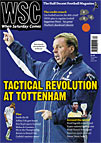 Neil Forsyth recalls a Carlisle takeover bid that turned out to be less than credible
Neil Forsyth recalls a Carlisle takeover bid that turned out to be less than credible
In an era when takeovers of football clubs involve sheikhs, billionaires and intricate financial arrangements, it is worth remembering a simpler time. A time when just about anyone could try to buy a football club and, in the memorable case of Stephen Brown, just about anyone did. Among the vast ranks of dreamers and chancers who have drifted into football for often questionable reasons, Brown stands alone for his sheer daring.
In 2001, Carlisle United were in bad shape – bottom of the Football League and with the increasingly unpopular Michael Knighton struggling to sell up. Enter Stephen Brown. A successful hotelier who had just parted with a Spanish business for an impressive £6 million, he was eager and ready to invest a seven-figure sum in the club. Brown was heralded as a possible saviour for United and held a confident news conference that provided some much needed hope for the team’s battered followers.
Unfortunately, the following days made everyone look somewhat foolish as the media began to unravel Brown’s true identity in a progressively surreal process. He was the former commercial manager of Scottish non-League club Gala Fairydean, where he had been dismissed after a few months. He lived in sheltered housing in the Scottish village of Peebles. He had worked as a barman in the town and recently as a waiter in a curry house, from where he may or may not have just been sacked. Perhaps worst of all was the Daily Telegraph’s scoop that Brown drove an ageing H-reg Vauxhall Cavalier.
Yet the most surprising revelations came from Partick Thistle. Chairman Brown McMaster and finance director Tom Hughes fairly choked on their breakfast when they read of Brown’s thwarted Carlisle dream. In 1998, Partick had been in dire straits. The Save our Jags campaign was up and running and the club were actively seeking investors. One of those who got in touch was Stephen Brown, a Canadian millionaire with a Scottish accent and big plans for the club.
Gala Fairydean and Carlisle are reluctant to reflect on their involvement with Brown, but McMaster and Hughes are not. “We knew there might be a problem,” recalls McMaster, now president of the Scottish Football League, “when he interrupted a call about this seven-figure investment to say that he had to go and check on his spaghetti.”
Hughes, who had several meetings with Brown, was given a more detailed description of the Canadian’s business empire. “He came to a game and we had a meeting in the boardroom before,” Hughes says. “He told us he had a trucking company over there with a hundred trucks. He was kind of dressed like a trucker as well, a big jacket and so on.” The trucking magnate explained he was returning to Canada, from where he bombarded Hughes with phone calls. The latter’s suspicions were aroused and he had a receptionist trace one of the calls. It had come not from Canada but from Glasgow and Hughes never spoke to him again, ignoring Brown’s calls until they stopped. “I’m just glad I never got to the press-conference stage,” he admits with some relief.
Carlisle, of course, had got to the press-conference stage. After the story broke and the disbelieving fans received yet further humiliation, there was a sheepish air in the Brunton Park boardroom. The press enjoyed Knighton’s discomfort and parallels were drawn with his abortive purchase of Manchester United, yet he certainly wasn’t about to recognise any similarity between himself and Brown. “This man has caused horrendous embarrassment to me and this club,” he announced. “I have never been hoodwinked in my life.”
After being rumbled, Brown neatly slipped away and there’s no indication where he is now. Perhaps the astronomical sums associated with football ownership today are beyond even his unlikely cover stories. Or maybe he’s idly polishing glasses in a curry house right now and dreaming of a return to the public eye. Many would like to see him do so.
From WSC 262 December 2008